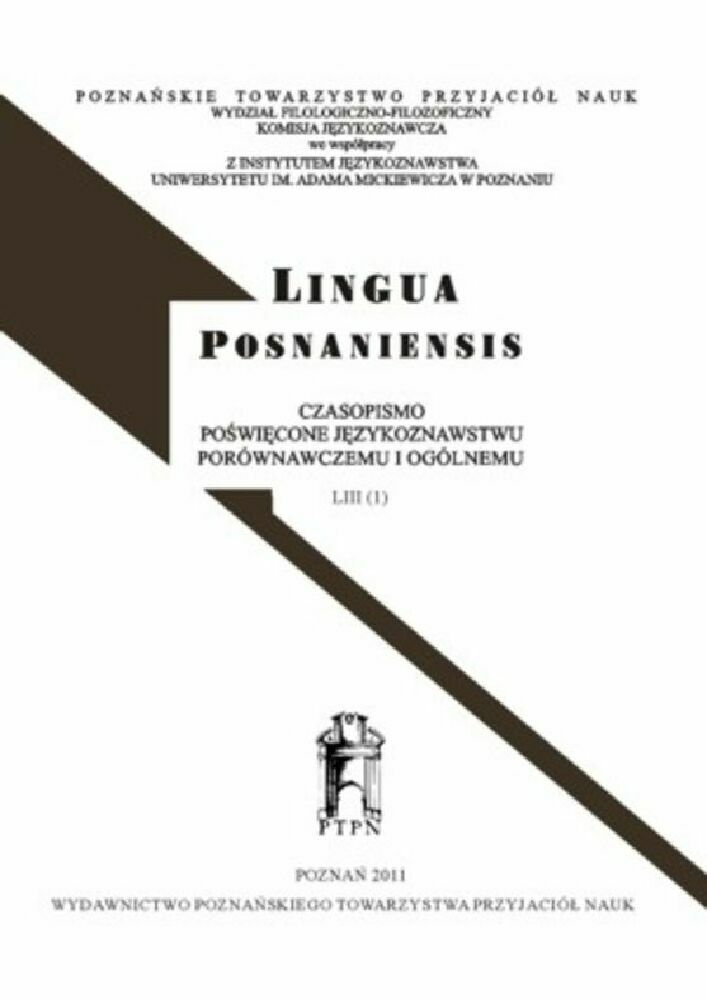Abstract
In this paper we focus on the functions of the future participle in Goan Konkani. In addition to the more-or-less expected functions of a future participle, such as nominal attribution or marking a future or modal predicate in various subordinate and main clauses, the future participle in Konkani can also mark main predicates with a past habitual interpretation in a construction which we refer to as the “promise-construction”, as it is only found with a small class of main predicates such as promise, intend, think, etc., which take an object complement clause. We argue that the future participle originally denoted an atemporal event and later came to include habitual events with any temporal value (past, present or future), and that this has since grammaticalized with exclusively past habitual temporal reference in this one construction, as this was likely the most common environment in which habitual events of this semantic class of verbs occur.
References
Almeida, M., S.J. 1989. A Description of Konkani. Panaji, Goa: Thomas Stephens Konknni Kendr.
Almeida, M., S.J. 2004. Konkani basic course. कोंकणी मुळावो कोर्स . Language Consultant: Maya Kharangate. Second revised edition. [तॉमास स्टीवन्स कोंकणी केंद्र प्रकाशन , 16.] Alto Porvorim, Goa: Thomas Stephens Konknni Kendr.
Almeida, M., S.J. 2012. Konknni course in Roman script. Romi lipient Konknni kors. Second edition. [TSKK Publications – 20]. Alto Porvorim, Goa: Thomas Stephens Konknni Kendr.
Caldwell, R. 1856. A comparative grammar of the Dravidian or South-Indian family of languages. London: Harrison. [Reprint: Scholar Select, 2015].
Eberhard, D.M. & Simons, G.F. & Fennig Ch.D. (eds.). 2022. Ethnologue: Languages of the World. Twenty-fifth edition. Dallas, Texas: SIL International. Online version: http://www.ethnologue.com. [Last accessed: 15 March, 2022].
Fleischman, S. 1990. Tense and narrativity. From medieval performance to modern fiction. London: Routledge. DOI: https://doi.org/10.7560/780903
Ghatage, A.M. 1963. Konkani of South Kanara. [A Survey of Marathi Dialects, 1]. Bombay: State Board for Literature and Culture.
Ghatage, A.M. 1965. Kuḍāli. [A survey of Marathi dialects, II]. Bombay: State Board for Literature and Culture.
Ghatage, A.M. 1966. Kuṇabī of Mahāḍ. [A survey of Marathi dialects, III]. Bombay: State Board for Literature and Culture.
Ghatage, A.M. 1968. Konkani of Kankon. [A survey of Marathi dialects, V]. Bombay: State Board for Literature and Culture.
Ghatage, A.M. 1972. Gāwḍi. [A survey of Marathi dialects, VIII]. Bombay: State Board for Literature and Culture.
Karapurkar, P.P. 1968. Descriptive analysis of Gawdi. (Doctoral dissertation, Poona: Deccan College)
Katre, S.M. 1966. The formation of Koṅkaṇī. [Deccan College, Building Centenary and Silver Jubilee Series, 23]. Poona: Deccan College Postgraduate and Research Institute.
Kittel, F. 1903. A grammar of the Kannaḍa language in English: Comprising the three dialects of the language (ancient, mediæval and modern). Mangalore: Basel Mission Book and Tract Depository. [Reprint: Forgotten Books, 2018].
Miranda, R. 2003. Konkani. In Cardona, G. & Jain, D. (eds.), The Indo-Aryan languages. [Routledge Language Family Series]. London–New York: Routledge. 729-765.
Murkuɳɖe, D.D. 2015. Itsa thɵ̃y marg. [Where there’s a will, there’s a way.] Naveli-Salset-Gõy: ʃri Hɵri Prɵkaʃɵn. 2015. [मुरकुंडे, दीपा दिनकर . 2015. इत्सा थंय मार्ग . नावेली-सालसेत -गोंय : श्री हरि प्रकाशन ].
Nadkarni, M.V. 1975. Bilingualism and syntactic change in Konkani. Language 51. 672-683. DOI: https://doi.org/10.2307/412892
Nau, N. & Spraunienė, B. 2021. Future tense and narrativity. Baltic Linguistics 12. 209-247. DOI: https://doi.org/10.32798/bl.924
Peterson, J. 2022. A sociolinguistic-typological approach to the linguistic prehistory of South Asia – two case studies. Language Dynamics and Change. 1-50. DOI: https://doi.org/10.1163/22105832-bja10018
Peterson, J. & Mopkar, G. Forthcoming. Delineating a case system: How many cases are there in Standard Goan Konkani – and why?
Peterson, J. & Chevallier, L. 2022. Towards a typology of South Asian Languages. Bhāṣā, Journal of South Asian Linguistics, Philology and Grammar Traditions 1/1: 17-62. DOI: https://doi.org/10.30687/bhasha/8409-3769/2022/01/005
License
Copyright (c) 2021 John Peterson, Govind Mopkar

This work is licensed under a Creative Commons Attribution-NonCommercial-NoDerivatives 4.0 International License.

